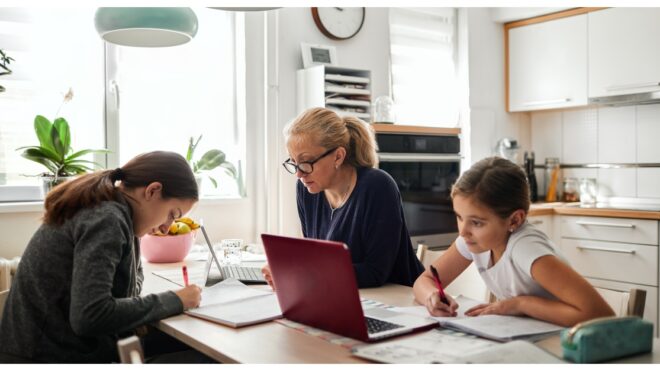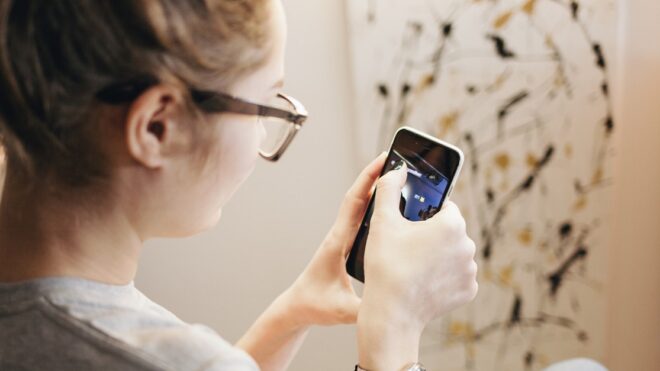Grocery shopping is a bit of a minefield these days, as we are all trying to keep ourselves and others in our communities, markets, and stores super safe and healthy. As such, there's a lot of information out there that is helpful — and a lot that is not. It makes sense that many of us have grocery questions right now.
It seems like the more information that's published about groceries, the more questions come up. Lately, a lot of people are talking about whether or not bleaching your groceries before eating them is an appropriate step to take.
The idea began making waves after a video was published in a recent California Today newsletter. The newsletter is produced by the New York Times. In the video, a food safety expert says that Californians should "shelter in place" and consider sanitizing their groceries before they put them away at home.
But not so fast, say other experts. While it is often wise to clean off some food that you eat, particularly fruits and vegetables, warm water is probably still totally sufficient.
This isn't the only grocery-related question people are asking these days. Here are questions we're all wondering, with answers from around the globe.
1. Do I need to sanitize my groceries with bleach?
The expert in the California Today video suggests using a "very diluted bleach solution (one teaspoon of bleach per gallon of water) to mist produce" before letting your food air-dry prior to putting it away. But putting bleach on your food may not be advisable, says Dr. Tamika Sims, the director of food technology communications at the International Food Information Council.
Dr. Sims has a doctorate in virology and immunology. She told Insider, "Yes, there can be a virus transfer risk if someone carrying the virus sneezes onto your produce and within hours you touch it and then immediately eat it — but the chances of this occurring are slim."
She also notes that we're not supposed to ingest bleach at all. "Bleach is not meant to be used to clean any foods or food products. The ingestion of any amount of bleach can be a major health hazard."
Instead, just wash your produce with warm water. Dr. Sims says, "CDC has told us that this virus denatures (breaks down) relatively easily with warm water and with heat." You can also rinse packaged items as well if you want to.
2. What time of the day should I go grocery shopping?
In terms of grocery shopping, it seems the much larger risk is actually shopping while there are crowds of people at the store. The reason to avoid crowds is because it ups your risk of exposure to any virus that you might be trying to avoid. Person-to-person transmission isn't really that hard, which is why we are advised to social distance ourselves at least 6 feet from others.
If you're shopping at times when your market is crowded, though, you might not have those 6 feet. Considering going shopping in the first hour that your favorite store is open, or late at night if it's open that long.
3. What precautions should I take before, during, and after grocery shopping?
It can definitely help you if you're smart about your grocery shopping. Wash your hands before you go, for at least 20 seconds, with plenty of warm water and soap. While you're shopping, try to only touch items you definitely know you want to buy. While wearing vinyl gloves might be tempting, it's important to save those resources for health care workers who need them. Make sure you're also not touching your face while you shop. It's a lot to keep up with, but it's worth it!
It's also not a bad idea to keep handheld sanitizer in your car, if you're lucky enough to find some. Sanitize your hands after loading your groceries into the car. Then wash your hands thoroughly when you get back home, unload your groceries, and wash your hands again.
4. How can I keep myself safe if I work at a grocery store?
The people who work at grocery stores actually have much more to contend with than those of us who are just there to shop. When you have to be at work for scheduled hours, you can't really avoid "peak traffic." Also, some stores are reportedly not letting their employees wear masks or gloves based on policy. Touching food and money is also a risk, and so is just interacting with the public.
There are steps that those of us shopping for food can take, though. If you can, don't shop with cash. A plastic card can be handled only by you at checkout, meaning the grocery store clerk doesn't have to touch your money. You can also make sure you avoid coughing or sneezing while you're in line.
5. Are there food shortages?
So far, it's expected that we shouldn't be experiencing any food shortages. That being said, it's entirely possible grocery stores near you will run out of certain foods, and there may be a delay in restocking because so much of our shipping is focused on medical supplies and hospital resources right now. When possible, it's advised that we all buy one to two weeks of food to avoid running out, and also to avoid making repeat trips to the store each week.
It's also worth noting that a lot of the advice and rules that apply to grocery stores also apply to ordering takeout food. As more and more people are spending time at home, there's been an uptick in ordering food to-go at favorite local restaurants and ordering delivery at home. Generally speaking, the packaging on the food should be OK. Simply remove the food from the packaging, dispose of the packaging, and then wash your hands before you start eating.
In fact, delivery companies like Postmates are also doing their part to make it easier and safer than ever to order delivery food. You can opt for contact-free deliveries, which keeps you and the driver who is bringing your food safe. Dominos is even in on this, and I speak from personal experience!
We ordered pizza a few days ago and received a phone call when our driver was here. He explained that he would leave our food on the front stoop, did so, and then headed back to his car. I called out a quick "Thank you!" once he was several feet away, and we both waved. It was nice.
As it stands, there's already a lot to be worrying about these days, whether or not you are prone to worrying. The news kind of does that for you! So it's nice to find solace wherever we can, right? And to that end, that's why it's good to stay up to date on the things you can control, like when you grocery shop and how you behave while there. It's about all of us, after all.







